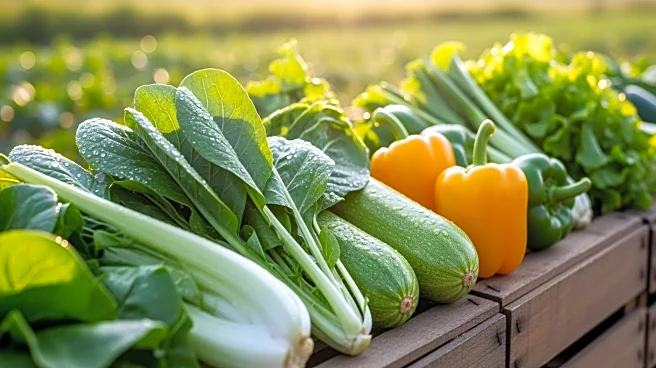What's Happening?
The U.S. organic farming market is projected to reach $287.3 billion by 2032, growing at a compound annual growth rate (CAGR) of 6.7% from 2025 to 2032. This growth is fueled by increasing consumer demand
for healthier, chemical-free foods, heightened food safety concerns, and sustainability awareness. Supportive government policies and expanding retail availability are also contributing factors. The Organic Trade Association reported that U.S. organic sales reached $71.6 billion in 2024, marking a 5.2% year-over-year growth. California has seen a significant surge in organic sales, with a 22% increase over the last five years, exceeding $11.8 billion. New state initiatives aim to transition 10% of cropland to organic by 2030. Additionally, tighter USDA regulations have been enacted to ensure stricter traceability and anti-fraud measures.
Why It's Important?
The expansion of the organic farming market reflects a broader shift towards sustainable agriculture practices in the U.S. This trend is significant for several reasons: it supports environmental conservation by reducing chemical usage, promotes healthier food options for consumers, and aligns with increasing public demand for transparency and traceability in food production. The growth in organic farming also presents economic opportunities for farmers and businesses involved in the organic supply chain, potentially leading to increased job creation and investment in rural areas. Furthermore, the emphasis on organic practices can help mitigate issues such as soil degradation and water pollution, contributing to long-term environmental sustainability.
What's Next?
Looking ahead, the organic farming sector is likely to see continued growth and innovation. The USDA's Organic Transition Initiative is expected to further support the conversion of farmland to organic practices. As consumer demand for organic products continues to rise, businesses may increase their focus on developing new organic offerings and expanding distribution channels. Additionally, the sector may experience increased scrutiny and regulation to ensure the integrity of organic products, particularly in light of rising imports. The ongoing development of organic farming technologies and techniques will likely improve crop yields and operational efficiency, further driving market expansion.
Beyond the Headlines
The growth of the organic farming market may have deeper implications for U.S. agriculture and food systems. As organic practices become more mainstream, there could be a shift in agricultural education and training programs to focus more on sustainable farming techniques. This could lead to a new generation of farmers who prioritize environmental stewardship and health-conscious food production. Moreover, the increased demand for organic products may influence broader food industry trends, encouraging conventional producers to adopt more sustainable practices and integrate organic options into their portfolios.










